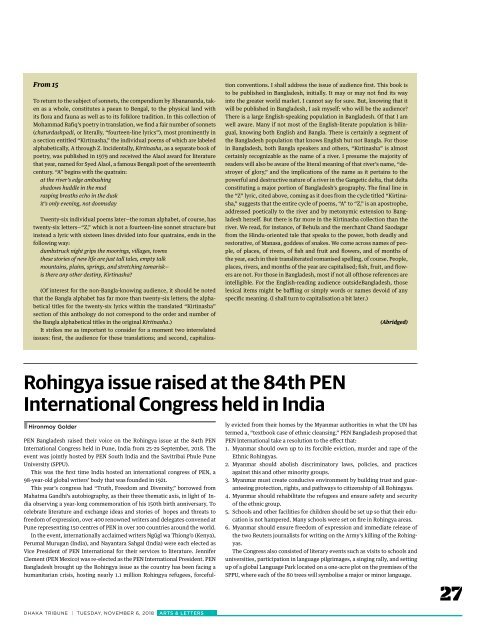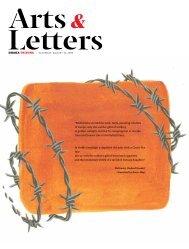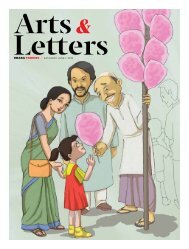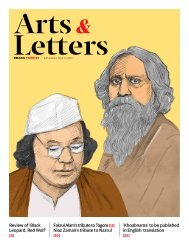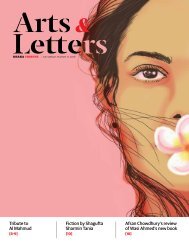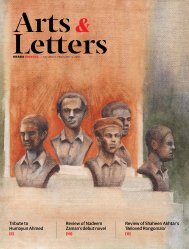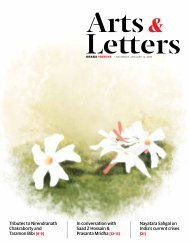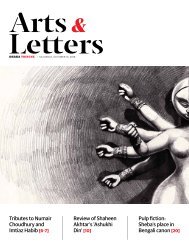A&L Nov_2018
You also want an ePaper? Increase the reach of your titles
YUMPU automatically turns print PDFs into web optimized ePapers that Google loves.
From 15<br />
To return to the subject of sonnets, the compendium by Jibanananda, taken<br />
as a whole, constitutes a paean to Bengal, to the physical land with<br />
its flora and fauna as well as to its folklore tradition. In this collection of<br />
Mohammad Rafiq’s poetry in translation, we find a fair number of sonnets<br />
(chaturdashpadi, or literally, “fourteen-line lyrics”), most prominently in<br />
a section entitled “Kirtinasha,” the individual poems of which are labeled<br />
alphabetically, A through Z. Incidentally, Kirtinasha, as a separate book of<br />
poetry, was published in 1979 and received the Alaol award for literature<br />
that year, named for Syed Alaol, a famous Bengali poet of the seventeenth<br />
century. “A” begins with the quatrain:<br />
at the river’s edge ambushing<br />
shadows huddle in the mud<br />
rasping breaths echo in the dusk<br />
it’s only evening, not doomsday<br />
Twenty-six individual poems later—the roman alphabet, of course, has<br />
twenty-six letters—“Z,” which is not a fourteen-line sonnet structure but<br />
instead a lyric with sixteen lines divided into four quatrains, ends in the<br />
following way:<br />
dumbstruck night grips the moorings, villages, towns<br />
these stories of new life are just tall tales, empty talk<br />
mountains, plains, springs, and stretching tamarisk—<br />
is there any other destiny, Kirtinasha?<br />
(Of interest for the non-Bangla-knowing audience, it should be noted<br />
that the Bangla alphabet has far more than twenty-six letters; the alphabetical<br />
titles for the twenty-six lyrics within the translated “Kirtinasha”<br />
section of this anthology do not correspond to the order and number of<br />
the Bangla alphabetical titles in the original Kirtinasha.)<br />
It strikes me as important to consider for a moment two interrelated<br />
issues: first, the audience for these translations; and second, capitalization<br />
conventions. I shall address the issue of audience first. This book is<br />
to be published in Bangladesh, initially. It may or may not find its way<br />
into the greater world market. I cannot say for sure. But, knowing that it<br />
will be published in Bangladesh, I ask myself: who will be the audience?<br />
There is a large English-speaking population in Bangladesh. Of that I am<br />
well aware. Many if not most of the English-literate population is bilingual,<br />
knowing both English and Bangla. There is certainly a segment of<br />
the Bangladesh population that knows English but not Bangla. For those<br />
in Bangladesh, both Bangla speakers and others, “Kirtinasha” is almost<br />
certainly recognizable as the name of a river. I presume the majority of<br />
readers will also be aware of the literal meaning of that river’s name, “destroyer<br />
of glory,” and the implications of the name as it pertains to the<br />
powerful and destructive nature of a river in the Gangetic delta, that delta<br />
constituting a major portion of Bangladesh’s geography. The final line in<br />
the “Z” lyric, cited above, coming as it does from the cycle titled “Kirtinasha,”<br />
suggests that the entire cycle of poems, “A” to “Z,” is an apostrophe,<br />
addressed poetically to the river and by metonymic extension to Bangladesh<br />
herself. But there is far more in the Kirtinasha collection than the<br />
river. We read, for instance, of Behula and the merchant Chand Saodagar<br />
from the Hindu-oriented tale that speaks to the power, both deadly and<br />
restorative, of Manasa, goddess of snakes. We come across names of people,<br />
of places, of rivers, of fish and fruit and flowers, and of months of<br />
the year, each in their transliterated romanised spelling, of course. People,<br />
places, rivers, and months of the year are capitalised; fish, fruit, and flowers<br />
are not. For those in Bangladesh, most if not all ofthose references are<br />
intelligible. For the English-reading audience outsideBangladesh, those<br />
lexical items might be baffling or simply words or names devoid of any<br />
specific meaning. (I shall turn to capitalisation a bit later.)<br />
(Abridged)<br />
Rohingya issue raised at the 84th PEN<br />
International Congress held in India<br />
• Hironmoy Golder<br />
PEN Bangladesh raised their voice on the Rohingya issue at the 84th PEN<br />
International Congress held in Pune, India from 25-29 September, <strong>2018</strong>. The<br />
event was jointly hosted by PEN South India and the Savitribai Phule Pune<br />
University (SPPU).<br />
This was the first time India hosted an international congress of PEN, a<br />
98-year-old global writers’ body that was founded in 1921.<br />
This year’s congress had “Truth, Freedom and Diversity,” borrowed from<br />
Mahatma Gandhi’s autobiography, as their three thematic axis, in light of India<br />
observing a year-long commemoration of his 150th birth anniversary. To<br />
celebrate literature and exchange ideas and stories of hopes and threats to<br />
freedom of expression, over 400 renowned writers and delegates convened at<br />
Pune representing 150 centres of PEN in over 100 countries around the world.<br />
In the event, internationally acclaimed writers Ngũgĩ wa Thiong’o (Kenya),<br />
Perumal Murugan (India), and Nayantara Sahgal (India) were each elected as<br />
Vice President of PEN International for their services to literature. Jennifer<br />
Clement (PEN Mexico) was re-elected as the PEN International President. PEN<br />
Bangladesh brought up the Rohingya issue as the country has been facing a<br />
humanitarian crisis, hosting nearly 1.1 million Rohingya refugees, forcefully<br />
evicted from their homes by the Myanmar authorities in what the UN has<br />
termed a, “textbook case of ethnic cleansing.” PEN Bangladesh proposed that<br />
PEN International take a resolution to the effect that:<br />
1. Myanmar should own up to its forcible eviction, murder and rape of the<br />
Ethnic Rohingyas.<br />
2. Myanmar should abolish discriminatory laws, policies, and practices<br />
against this and other minority groups.<br />
3. Myanmar must create conducive environment by building trust and guaranteeing<br />
protection, rights, and pathways to citizenship of all Rohingyas.<br />
4. Myanmar should rehabilitate the refugees and ensure safety and security<br />
of the ethnic group.<br />
5. Schools and other facilities for children should be set up so that their education<br />
is not h<strong>amp</strong>ered. Many schools were set on fire in Rohingya areas.<br />
6. Myanmar should ensure freedom of expression and immediate release of<br />
the two Reuters journalists for writing on the Army's killing of the Rohingyas.<br />
The Congress also consisted of literary events such as visits to schools and<br />
universities, participation in language pilgrimages, a singing rally, and setting<br />
up of a global Language Park located on a one-acre plot on the premises of the<br />
SPPU, where each of the 80 trees will symbolise a major or minor language.<br />
27<br />
DHAKA TRIBUNE | TUESDAY, NOVEMBER 6, <strong>2018</strong><br />
ARTS & LETTERS


